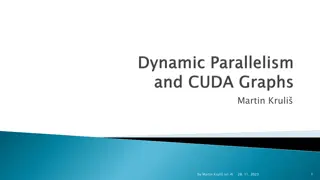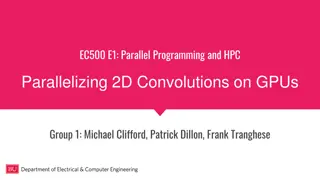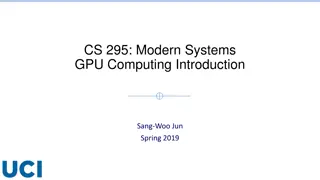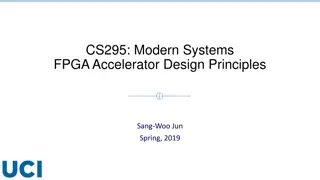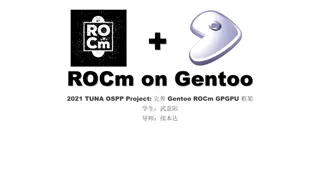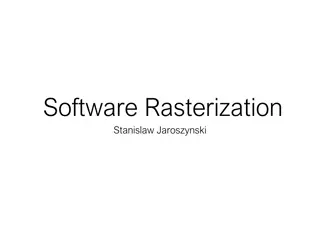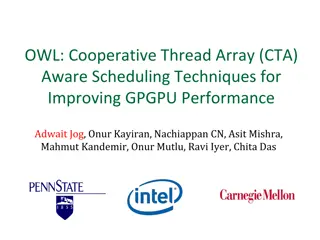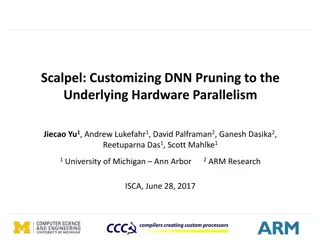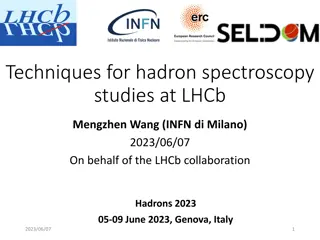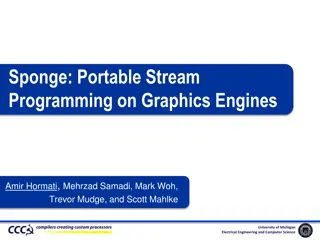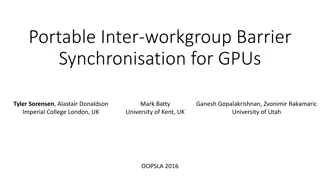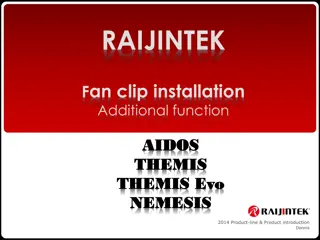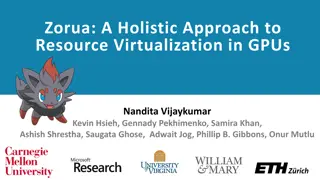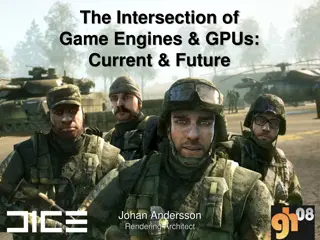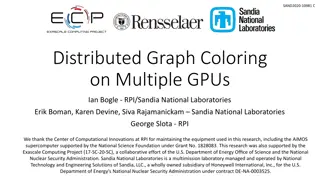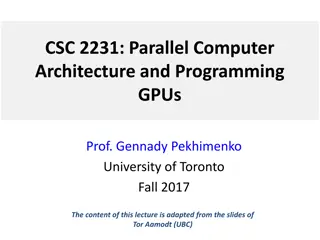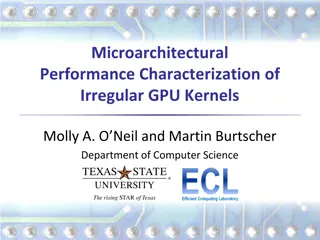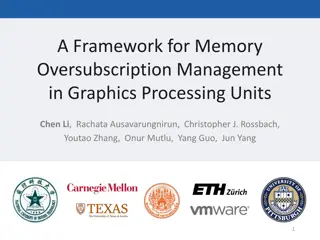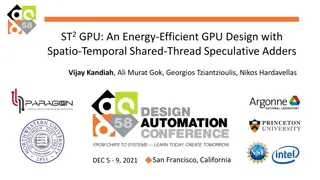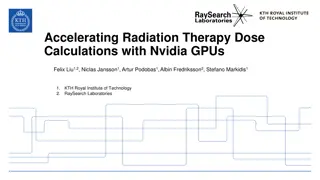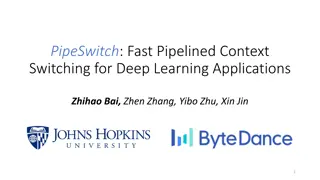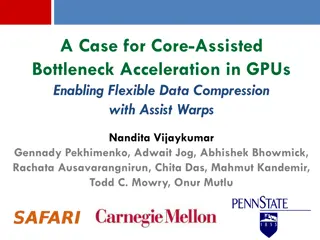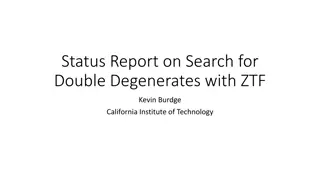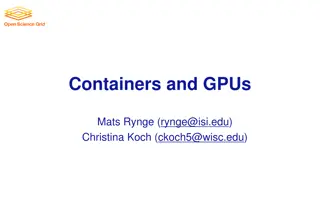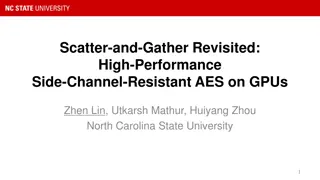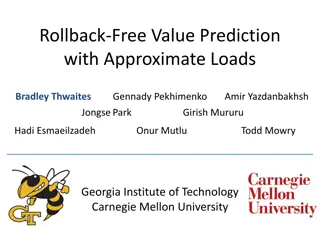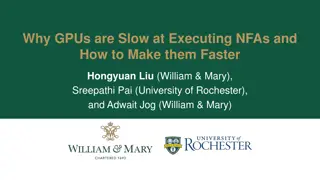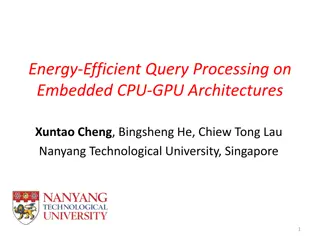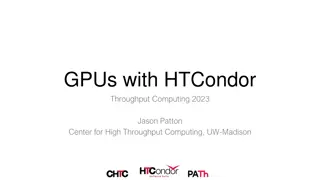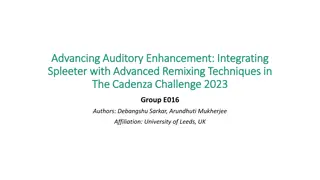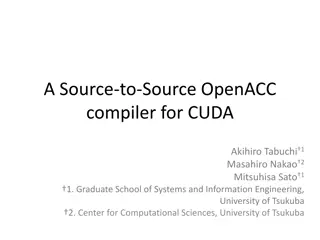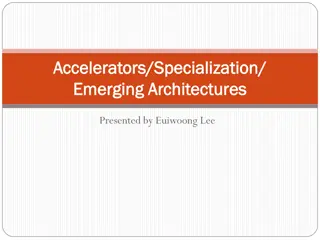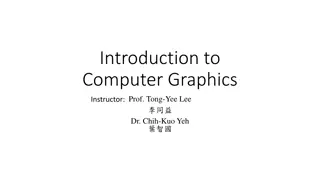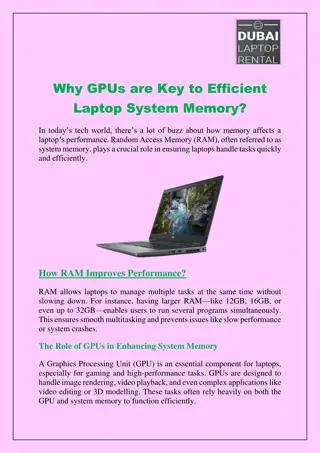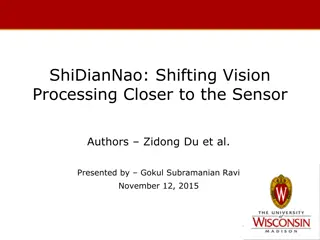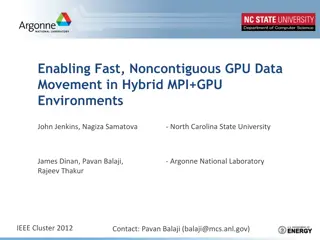USING GPUS IN DEEP LEARNING FRAMEWORKS
Delve into the world of deep learning with a focus on utilizing GPUs for enhanced performance. Explore topics like neural networks, TensorFlow, PyTorch, and distributed training. Learn how deep learning algorithms process data, optimize weights and biases, and predict outcomes through training loops
4 views • 98 slides
Understanding Parallelism in GPU Computing by Martin Kruli
This content delves into different types of parallelism in GPU computing, such as task parallelism and data parallelism, along with discussing unsuitable problems for GPUs and providing solutions like iterative kernel execution and mapping irregular structures to regular grids. The article also touc
1 views • 39 slides
Optimizing Memory Usage on GPUs Through a Marie Kondo Approach
Learn how to apply Marie Kondo's "spark joy" rule to optimize memory on GPUs by evaluating the necessity of data reads, reducing memory usage, and encoding images efficiently. Explore challenges and examples in memory optimization on the GPU for better performance.
6 views • 41 slides
Exploring GPU Parallelization for 2D Convolution Optimization
Our project focuses on enhancing the efficiency of 2D convolutions by implementing parallelization with GPUs. We delve into the significance of convolutions, strategies for parallelization, challenges faced, and the outcomes achieved. Through comparing direct convolution to Fast Fourier Transform (F
0 views • 29 slides
Understanding Modern GPU Computing: A Historical Overview
Delve into the fascinating history of Graphic Processing Units (GPUs), from the era of CPU-dominated graphics computation to the introduction of 3D accelerator cards, and the evolution of GPU architectures like NVIDIA Volta-based GV100. Explore the peak performance comparison between CPUs and GPUs,
5 views • 20 slides
FPGA Accelerator Design Principles and Performance Snapshot
This content explores the principles behind FPGA accelerator design, highlighting the extreme pipelining via systolic arrays that enables FPGAs to achieve high speeds despite lower clock frequencies compared to CPUs and GPUs. It delves into the application of Flynn's Taxonomy, performance snapshots
0 views • 17 slides
Exploring Radeon Open Ecosystem (ROCm) on Gentoo Platform
Delve into the detailed guide for deploying Radeon Open Ecosystem (ROCm) on Gentoo, a versatile platform offering high-performance computing on Radeon GPUs. Discover the seamless integration, benefits of customization, and the compatibility with Gentoo Prefix for portability without root privileges.
4 views • 13 slides
Understanding GPU Rasterization and Graphics Pipeline
Delve into the world of GPU rasterization, from the history of GPUs and software rasterization to the intricacies of the Quake Engine, graphics pipeline, homogeneous coordinates, affine transformations, projection matrices, and lighting calculations. Explore concepts such as backface culling and dif
0 views • 17 slides
Improving GPGPU Performance with Cooperative Thread Array Scheduling Techniques
Limited DRAM bandwidth poses a critical bottleneck in GPU performance, necessitating a comprehensive scheduling policy to reduce cache miss rates, enhance DRAM bandwidth, and improve latency hiding for GPUs. The CTA-aware scheduling techniques presented address these challenges by optimizing resourc
0 views • 33 slides
Optimizing DNN Pruning for Hardware Efficiency
Customizing deep neural network (DNN) pruning to maximize hardware parallelism can significantly reduce storage and computation costs. Techniques such as weight pruning, node pruning, and utilizing specific hardware types like GPUs are explored to enhance performance. However, drawbacks like increas
0 views • 27 slides
Techniques for Hadron Spectroscopy Studies at LHCb
Hadron spectroscopy studies at LHCb focus on searching for new hadrons, measuring their properties like lineshape, lifetime, and decay modes. The LHCb detector is optimized for collecting, reconstructing, and identifying signals to improve knowledge about hadron spectroscopy. Development of data ana
0 views • 30 slides
Understanding GPU Programming Models and Execution Architecture
Explore the world of GPU programming with insights into GPU architecture, programming models, and execution models. Discover the evolution of GPUs and their importance in graphics engines and high-performance computing, as discussed by experts from the University of Michigan.
0 views • 28 slides
Portable Inter-workgroup Barrier Synchronisation for GPUs
This presentation discusses the implementation of portable inter-workgroup barrier synchronisation for GPUs, focusing on barriers provided as primitives, GPU programming threads and memory management, and challenges such as scheduling and memory consistency. Experimental results and occupancy-bound
0 views • 61 slides
RAIJINTEK Fan Clip Installation and Product Line Overview
In this informative content, you will find a detailed guide on RAIJINTEK fan clip installation for various products like AIDOS, THEMIS, THEMIS Evo, NEMESIS, and more. Additionally, it covers features such as silent operation, different fan configurations, heatpipe sizes, material specifications like
0 views • 6 slides
Zorua: A Holistic Resource Virtualization in GPUs Approach
This paper presents Zorua, a holistic resource virtualization framework for GPUs that aims to reduce the dependence on programmer-specific resource usage, enhance resource efficiency in optimized code, and improve programming ease and performance portability. It addresses key issues such as static a
0 views • 43 slides
Game Engines & GPUs: Current & Future Intersection with Graphics Hardware
Explore the current and future landscape of graphics hardware in relation to game engines and GPUs. Delve into the use cases, implications, and advancements in areas such as shaders, texturing, ray tracing, and GPU compute. Learn about Frostbite, DICE's proprietary engine, and its focus on large out
0 views • 45 slides
Distributed Graph Coloring on Multiple GPUs: Advancements in Parallel Computation
This research introduces a groundbreaking distributed memory multi-GPU graph coloring implementation, achieving significant speedups and minimal color increase. The approach enables efficient coloring of large-scale graphs with billions of vertices and edges. Additionally, the study explores the pra
0 views • 22 slides
Introduction to GPUs in Parallel Computer Architecture
This lecture discusses Parallel Computer Architecture and Programming GPUs, covering topics like the history of GPUs, the role of GPUs in parallel computing, and the evolution of GPU technology. It also highlights the use of GPUs for raster-based graphics, their programmability, and their significan
0 views • 12 slides
Microarchitectural Performance Characterization of Irregular GPU Kernels
GPUs are widely used for high-performance computing, but irregular algorithms pose challenges for parallelization. This study delves into the microarchitectural aspects affecting GPU performance, emphasizing best practices to optimize irregular GPU kernels. The impact of branch divergence, memory co
0 views • 26 slides
A Framework for Memory Oversubscription Management in GPUs
Memory oversubscription in GPUs leads to performance degradation or crashes, necessitating the development of application-transparent mechanisms like the ETC framework. This framework incorporates eviction, throttling, and compression techniques to improve GPU performance across various applications
0 views • 30 slides
Energy-Efficient GPU Design with Spatio-Temporal Shared-Thread Speculative Adders
Explore the significance of GPUs in modern systems, with emphasis on their widespread adoption and performance improvements over the years. The focus is on the need for low-power adders in GPUs due to high arithmetic intensity in GPU workloads.
0 views • 46 slides
Accelerating Radiation Therapy Dose Calculations with Nvidia GPUs
Accelerating Radiation Therapy Dose Calculations with Nvidia GPUs by Felix Liu, Niclas Jansson, Artur Podobas, Albin Fredriksson, and Stefano Markidis discusses the utilization of GPU technology to improve efficiency in radiation treatment planning. The process involves creating patient-specific tre
0 views • 18 slides
Efficient Context Switching for Deep Learning Applications Using PipeSwitch
PipeSwitch is a solution that enables fast and efficient context switching for deep learning applications, aiming to multiplex multiple DL apps on GPUs with minimal latency. It addresses the challenges of low GPU cluster utilization, high context switching overhead, and drawbacks of existing solutio
0 views • 46 slides
Core-Assisted Bottleneck Acceleration in GPUs: Maximizing Resource Utilization
Imbalances in GPU execution lead to underutilization of resources, prompting the need for a solution like CABA (Core-Assisted Bottleneck Acceleration). This framework enables the efficient use of helper threads in GPUs, addressing memory bandwidth bottlenecks through flexible data compression. By le
0 views • 37 slides
Exploration of Double Degenerates in White Dwarf Binaries
The search for double degenerates in white dwarf binaries involves techniques like eclipses, ellipsoidal modulation, and irradiation of companions. Discoveries such as an orbital period of 20 minutes, orbital decay measurements, and technical challenges in data processing using GPUs are highlighted.
0 views • 14 slides
Understanding Containers and GPUs for Efficient Computing
Discover the power of Graphical Processing Units (GPUs) and how they can be harnessed through containers for parallelized workloads in tasks such as deep learning, molecular dynamics, and number crunching. Learn about GPU use cases, managing GPU jobs, requesting GPUs, and the benefits of using conta
0 views • 21 slides
Introduction to Boston University's Shared Computing Cluster
Boston University's Shared Computing Cluster (SCC) provides researchers with access to a high-performance computing environment for running code, collaborating on shared data, and utilizing specialized software packages. With over 800 nodes, 20,000 processors, and hundreds of GPUs, the SCC offers re
0 views • 63 slides
Scatter-and-Gather Revisited: High-Performance Side-Channel-Resistant AES on GPUs
This research focuses on enhancing the security of AES encryption on GPUs by introducing the Scatter-and-Gather (SG) approach, aimed at achieving side-channel resistance and high performance. By reorganizing tables to prevent key-related information leakage, the SG approach offers a promising soluti
0 views • 34 slides
Enhancing Processor Performance Through Rollback-Free Value Prediction
Mitigating memory and bandwidth walls, this research extends rollback-free value prediction to GPUs, achieving up to 2x improvement in energy and performance while maintaining 10% quality degradation. Utilizing microarchitecturally-triggered approximation to predict missed loads, this work focuses o
0 views • 7 slides
GPU Acceleration in ITK v4 Overview
This presentation by Won-Ki Jeong from Harvard University at the ITK v4 winter meeting in 2011 discusses the implementation and advantages of GPU acceleration in ITK v4. Topics covered include the use of GPUs as co-processors for massively parallel processing, memory and process management, new GPU
0 views • 33 slides
Understanding GPU Performance for NFA Processing
Hongyuan Liu, Sreepathi Pai, and Adwait Jog delve into the challenges of GPU performance when executing NFAs. They address data movement and utilization issues, proposing solutions and discussing the efficiency of processing large-scale NFAs on GPUs. The research explores architectures and paralleli
0 views • 25 slides
Energy-Efficient Query Processing on Embedded CPU-GPU Architectures
This study explores the energy efficiency of query processing on embedded CPU-GPU architectures, focusing on the utilization of embedded GPUs and the potential for co-processing with CPUs. The research evaluates the performance and power consumption of different processing approaches, considering th
0 views • 22 slides
Maximizing GPU Throughput with HTCondor in 2023
Explore the integration of GPUs with HTCondor for efficient throughput computing in 2023. Learn how to enable GPUs on execution platforms, request GPUs for jobs, and configure job environments. Discover key considerations for jobs with specific GPU requirements and how to allocate GPUs effectively.
0 views • 22 slides
Advancing Auditory Enhancement: Integrating Spleeter with Advanced Remixing Techniques in The Cadenza Challenge 2023
Our project for The Cadenza Challenge 2023 focused on improving audio for headphone users with hearing loss by integrating Spleeter's deep learning capabilities. We utilized N-ALR prescriptions, Butterworth bandpass filters, and Dynamic Range Compression to enhance audio quality. By leveraging advan
0 views • 19 slides
OpenACC Compiler for CUDA: A Source-to-Source Implementation
An open-source OpenACC compiler designed for NVIDIA GPUs using a source-to-source approach allows for detailed machine-specific optimizations through the mature CUDA compiler. The compiler targets C as the language and leverages the CUDA API, facilitating the generation of executable files.
0 views • 28 slides
Exploring Accelerators and Emerging Architectures in Specialized Computing
Delve into the world of accelerators and specialized computing architectures with a focus on application-specific designs like GPUs and FPGAs. Discover the challenges of performance efficiency and generality in the Iron Triangle paradigm, alongside innovative solutions presented in recent research p
0 views • 61 slides
Overview of OpenGL: A Comprehensive Guide
OpenGL, a vital graphics library, was created in 1991 by Silicon Graphics and is now managed by the Khronos consortium. It serves as a language and platform-independent API for rendering 2D/3D graphics, interacting with GPUs. OpenGL offers a rich set of functions and constants, supports applications
0 views • 77 slides
Why GPUs Are Key to Efficient Laptop System Memory?
Rent a Laptop in Dubai equipped with top-notch GPUs from Dubai Laptop Rental to tackle projects like design, animation, and gaming. For more Laptop Rental options, Contact us at 971-50-7559892 today.
1 views • 2 slides
ShiDianNao: Advancing Vision Processing Closer to Sensors
Neural network accelerators are achieving high energy efficiency and performance for recognition and mining applications. To overcome memory bandwidth constraints, the proposal suggests mapping the entire CNN into SRAM and moving closer to sensors to minimize memory access for I/O. Placing the CNN a
0 views • 24 slides
Fast Noncontiguous GPU Data Movement in Hybrid MPI+GPU Environments
This research focuses on enabling efficient and fast noncontiguous data movement between GPUs in hybrid MPI+GPU environments. The study explores techniques such as MPI-derived data types to facilitate noncontiguous message passing and improve communication performance in GPU-accelerated systems. By
0 views • 18 slides

